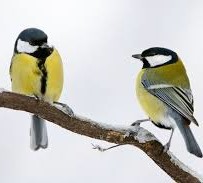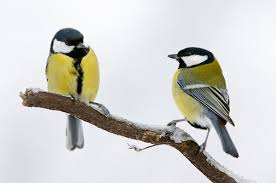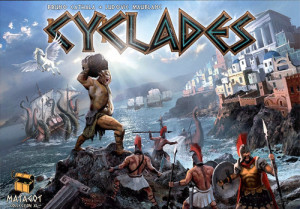The Parable of the Two Birds

(. . . or the strength and beauty in diversity.)

Great Tits!
Competition has arisen as a topic in conversation and focus of mediation in my life several times recently. We live in a nation hotly divided where ideologies and even accepted realities clash with one another. We are surrounded by media which highlight this nature of our society. When I listen to the news of what is happening in the world, governmental policy shifts and politician’s wives’ outfits alike are contextualized from the perspective of this perpetual competition between right and wrong, good and evil, blue and red. Or is it red and blue? Our press no longer evaluate the merits of a bill as it passes through our legislature, they do not examine the tangible effect the policy will have on every day life. Instead, they discuss the impact the passing of the bill will have on the larger ideological and political war being waged around and through us. They focus on who is winning in a giant football game of political power.
Our nation and our culture embraced the scientific and industrial revolutions when they arrived. We manifested those concepts derived from the observation of nature and applied them to our social structures. We mixed in a dash of rugged individualism and a rebellious spirit, and here we have arrived in a place where a Social Darwinism pervades our interactions even if we are no longer aware of its influence. Survival of the fittest is celebrated in our reality television as well as in our reality. Our Mother Culture insists, ‘This is how the natural world works’ and so it is natural and right for this to be how the human world works.
The trouble is, when we look at the natural world more deeply and understand the mechanisms at work behind evolution and natural selection with greater data and deeper vision, we can see that the understanding of the processes of nature upon which our culture has built its essential social philosophies is limited. Darwin’s theory of evolution and the processes of natural selection do not work on the level of individual success and failure. They are processes supporting the survival of a species and an ecosystem as a whole and through the flow of time.
There was a study conducted early in this century which examined the success and failures of a bunch of great tits. This study looked at the birds from the perspective of behavioral biology and asked the question, why are their different personalities? They looked at two simple personality traits: bold and shy. I think these are particularly interesting traits to examine considering our social prejudice for one personality type over the other. ‘Fortune,’ our Mother Culture whispers in our ear, ‘favors the bold!’ Mother Culture lies to us. Or to be more specific, she isn’t telling us the whole truth.
In the lives of the great tits, fortune sometimes favors the bold and sometimes favors the shy. In a world of constantly shifting realities, the survival of the whole species depends upon this diversity of approaches. There is not one right way for the great tit to be if he/she wants to survive. If the whole community hopes to survive, in fact, there needs to be great diversity among individuals in the population. This recognition of the value and importance of diversity is lost in a culture which holds to an idea of there being one right way. This becomes particularly dangerous for the survival of that culture when they also believe that the one right way must be enforced. The great tits would not survive if they all had to fit a single mold, but in the expression of their true and unique individual natures, they contribute to the health and vibrancy of the whole.
Its a pervasive belief, however, and difficult to get away from; The One Right Way.
A friend of mine is an avid sportsman and serious competitor. He plays on a baseball team and they take the game seriously, traveling to play games with equally serious competitors. He recently returned from a weekend excursion unsatisfied with his experience because his team lost their game. I asked him if he had at least enjoyed playing the game, but he said he had not because of the final outcome of the competition. This troubled me and I have contemplated it a great deal. My personality and perspective on competition is different and my culturally inherited instinct was to decide which one of our two perspectives was the right one.
I am not a competitor. At least, this is what I tell myself. I am not sure where that voice comes from, though, and I think it is only partially true. I have consciously adapted the belief that its all about the journey. I have decided to embrace the idea that the destination is irrelevant and remind myself regularly to enjoy each and every moment because all we ever can have is the present. I have never been much of a sports player. I dabbled in soccer and softball in my youth, but I seemed to gravitate toward more solo endeavors than team sports, so competition was not a part of my upbringing in the straightforward team sport kind of way. I have however, discovered a more competitive spirit in my adult life, and I have grown quite fond of playing board games.

Cover art for the board game Cyclades.
(On a side note: My favorite game currently is one called Cyclades. Its a beautifully designed and complex strategy game painted in the colors of ancient Greek mythology in which you compete with the leaders of the other island states to buy the favor of the gods to destroy your rivals and build the mightiest nation. Release the Kraken!)
So I felt the tug of war between the fierceness of his competitor spirit; ‘why play if its not to win.?’ and the meekness of my collaborator spirit; ‘Its not whether you win or lose, its how you play the game.’ I could hear Mother Culture whispering in my ear that his position was the better one. My position was the one chosen only by losers. ‘The ones who claim they don’t care if they win are the ones who can’t win.’ Those words are slippery as poison.
The more I thought upon it, however, the more I came to realize that it truly is the game that I savor, not the victory. I enjoy being in competition. I long for that full engagement, total presence in the moment, connection with my fellow humans. I don’t prefer this because I can’t win. I do win. I prefer it because the winning or losing is but a moment. It feels good to win. Yes. It feels bad to lose. Yes. Still, it is only a moment. The game lasts and the ending is riddled with chance. Beyond my control. I truly like being in the middle of the struggle, challenging my mind to think further ahead, to stay on top of events, to strive toward victory, I’m just not emotionally attached to the end.
I think this and then I start to feel smug. I love my way of looking at the world. It gives me great pleasure and I start to feel superior in my collaborator nature. I feel sorry for my friend, confused and mistaken in his competitive ways. ‘He would be more happy if he was like me.’ I think.
Here is the flip side of that one right way coin.
I have to remember the great tits. (you’re giggling about it now, aren’t you?)
I have to remember the truth that fortune favors the shy and the bold. The world needs them both.
Staying present in the moment. Being a collaborator. Remaining unattached to the outcome or the end of the journey. This seems to be working for me right now in this moment. It won’t work for everyone. It doesn’t have to. No more than a focused and driven vision toward success will work for everyone. It doesn’t have to either. The truth of it is that a healthy and vibrant culture needs them both to survive and to thrive.
I am grateful for my competitive friend. We need these people. When things get difficult and strength and single minded determination are needed. When faced with famine and a cold long winter. When a pack of hungry wolves are just outside the gates. We need those who will fight relentlessly for victory, who are not satisfied until they have attained it, and will therefore never taste defeat.
I am grateful for my own different nature. We need collaborators too. There are times when we need to nurture life and build bridges. There are times when we must work with one another and with nature rather than against.
Sometimes we need to simply be. Here. Now.
Let me bring all this back around to the political and social climate of the moment. This war of ideologies we are engaged in is an illusion. There is nothing as simple and clear as two sides to any issue. The world has problems. Humans have incredible power over our environment and over one another. We are not omniscient nor omnipresent. We are not perfect and our programing is all over the place. Our actions have consequences, intended and unintended. Humans have made these problems, whether we meant to or not or were even alive when it started. It is in our hands to fix them.
It does not matter if we like it or not, the reality is that we live in an interdependent world. We need one another. We cannot isolate any action. Perhaps it seemed that in a slower time we could, but that was an illusion. We are all one, but that doesn’t mean we all have to be the same.
There is great beauty and opportunity in diversity and I hope that we can learn to embrace it more, even if embracing diversity isn’t for everyone.
So, ‘You do you’. That’s all I’ve got to say. That and ‘Great tits!’
Here is what people are posting about Social Darwinism:
Error: Access token session has expired, please reauthorize access token.
